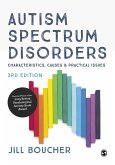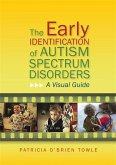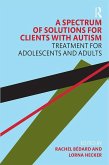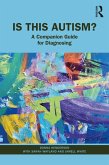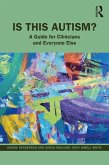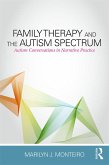What are the historical foundations of autism and what precisely is meant by the 'autistic spectrum'? How can we explain behavioural patterns of people with autism, young or old, and what are the major theoretical bases for understanding these? What is the latest thinking regarding diagnosis, and what are the most effective strategies for assessment, education and care for people on the autistic spectrum?
From historical information to methods of assessment, and from intervention to education and support, this informative and accessible text explores theories at the psychological, neurobiological and 'first cause' levels. This fully up to date Third Edition answers these questions with a strong practical focus, encompassing the latest research on autistic spectrum disorders. New features include:
Jill Boucher is a retired academic psychologist. Her most recent post was Professor of Developmental Psychology at City, University of London.
From historical information to methods of assessment, and from intervention to education and support, this informative and accessible text explores theories at the psychological, neurobiological and 'first cause' levels. This fully up to date Third Edition answers these questions with a strong practical focus, encompassing the latest research on autistic spectrum disorders. New features include:
- Further reading suggestions
- Glossary of technical terms
- Updated information on autism support services
- Personal illustrative examples
Jill Boucher is a retired academic psychologist. Her most recent post was Professor of Developmental Psychology at City, University of London.
Dieser Download kann aus rechtlichen Gründen nur mit Rechnungsadresse in A, D ausgeliefert werden.
A free spirit and strongly critical mind; an independent thinker, with encyclopedic knowledge of autism. Who else can write a multidisciplinary book on autism single-handedly?
Laurent Mottron, Professor of Psychiatry and research Chair in Cognitive Neuroscience of Autism, University of Montreal.
An invaluable and comprehensive go-to- guide for both my BPhil and Med in Autism, providing reliable information in an easily accessible way.
Trudi Rainsberry, Special Educational Needs Teacher and Researcher specialising in autism.
The author of this excellent book states in the preface that she intended to "provide an account of autism that people with little or no specialist knowledge will find comprehensible and digestible, but which at the same time offers more advanced readers a clear summary of existing knowledge". In my opinion, she has achieved her stated goal, in a most impressive volume which does justice to the complexity of the subject covered, without being over-long or alienating the less knowledgeable reader. This is no mean feat, as the book covers topics as disparate as the potential genetic cause of autism and the principle of inclusive care as applied to people with autism. The result is a handbook which I would have no hesitation in recommending to an intelligent parent of a child with autism, a teacher, and undergraduate student or a clinical trainee. In fact, I feel that this book has something to offer even a supposed "expert" in the study of autism since it so neatly synthesises historic and current understanding of the condition... a thoughtfully written book, which makes a modern, thorough and readable account of a complex and intriguing condition - Autism
This is an authoritative, accessible and original approach to our current understanding of autistic spectrum disorders - Rita Jordan PhD, Emeritus Professor in Autism Studies, University of Birmingham
Jill Boucher is a leading academic and clinician who brings an individual and authoritative perspective to the autism field. In this book she does an excellent job of communicating a broad range of practical as well as theoretical issues to a general audience, making up-to-date information about this puzzling condition accessible to a wide readership. Boucher s book is a welcome and unique addition to the literature - Tony Charman, Professor of Neurodevelopmental Disorders, University College of London
As a parent, I found this book insightful, and it was useful to learn how autism is understood by clinicians and researchers. As a student, I found the writing clear and informative. Psychology student and mother of a son with ASD
Reviewers of the second edition
Laurent Mottron, Professor of Psychiatry and research Chair in Cognitive Neuroscience of Autism, University of Montreal.
An invaluable and comprehensive go-to- guide for both my BPhil and Med in Autism, providing reliable information in an easily accessible way.
Trudi Rainsberry, Special Educational Needs Teacher and Researcher specialising in autism.
The author of this excellent book states in the preface that she intended to "provide an account of autism that people with little or no specialist knowledge will find comprehensible and digestible, but which at the same time offers more advanced readers a clear summary of existing knowledge". In my opinion, she has achieved her stated goal, in a most impressive volume which does justice to the complexity of the subject covered, without being over-long or alienating the less knowledgeable reader. This is no mean feat, as the book covers topics as disparate as the potential genetic cause of autism and the principle of inclusive care as applied to people with autism. The result is a handbook which I would have no hesitation in recommending to an intelligent parent of a child with autism, a teacher, and undergraduate student or a clinical trainee. In fact, I feel that this book has something to offer even a supposed "expert" in the study of autism since it so neatly synthesises historic and current understanding of the condition... a thoughtfully written book, which makes a modern, thorough and readable account of a complex and intriguing condition - Autism
This is an authoritative, accessible and original approach to our current understanding of autistic spectrum disorders - Rita Jordan PhD, Emeritus Professor in Autism Studies, University of Birmingham
Jill Boucher is a leading academic and clinician who brings an individual and authoritative perspective to the autism field. In this book she does an excellent job of communicating a broad range of practical as well as theoretical issues to a general audience, making up-to-date information about this puzzling condition accessible to a wide readership. Boucher s book is a welcome and unique addition to the literature - Tony Charman, Professor of Neurodevelopmental Disorders, University College of London
As a parent, I found this book insightful, and it was useful to learn how autism is understood by clinicians and researchers. As a student, I found the writing clear and informative. Psychology student and mother of a son with ASD
Reviewers of the second edition



